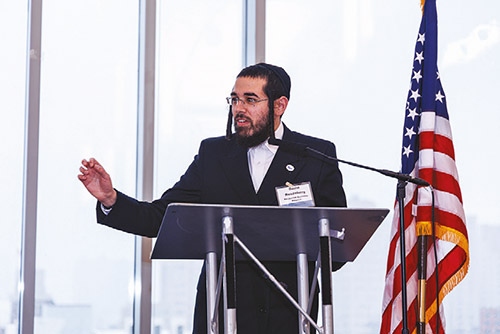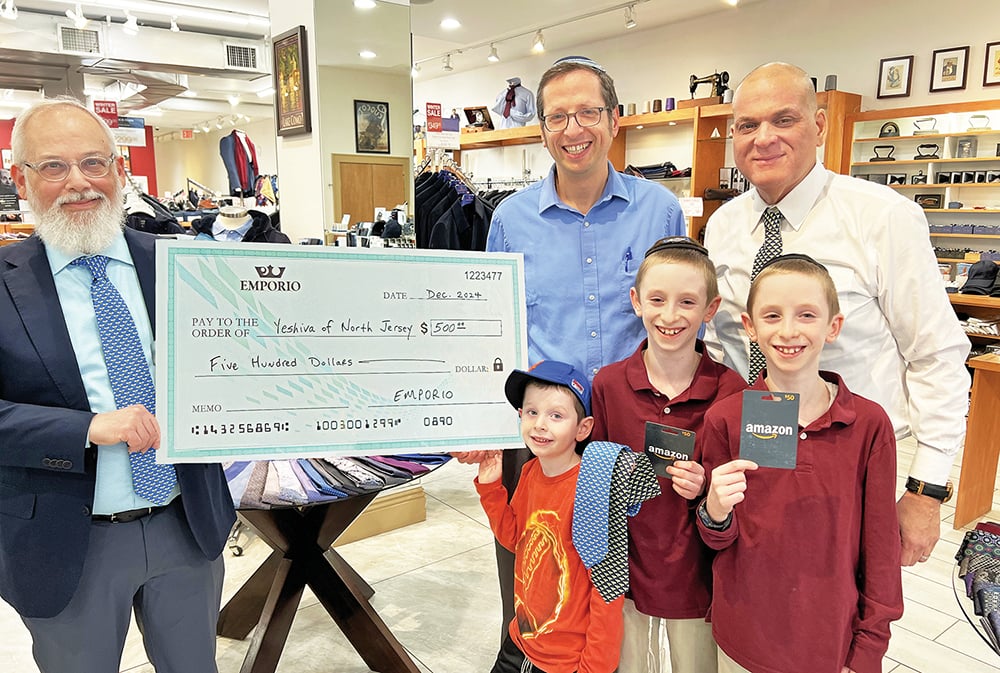

On March 9 the Northern New Jersey Women for Israel group of the Jewish National Fund held a pre-Purim celebration. Michal Levison, culture engagement expert and author of two five-star Amazon cookbooks led a hamantashen baking demonstration. Sheryl Buchholtz, chair of JNF’s Galilee Culinary Institute, briefed attendees on JNF’s Galilee projects to transform Northern Israel into a thriving community and culinary hub.
Participants assisted as Levison demonstrated her grandmother Bella’s recipe. On Levison’s father’s side, Bella, a Holocaust-orphaned survivor from Warsaw, met her husband in a DP camp and eventually reached Israel. Levison’s other grandmother was born in pre-State Palestine, the child of an engineer for Baron de-Rothschild’s flour mills. “With my great-grandfather running flour mills, my grandmother grew up on the mill floor throwing flour.” Levison recalled. “Both grandmothers were amazing cooks. Bella never wrote down recipes; she thought that she had it all in her head. But my mother’s mother loved to collect her friends’ recipes. When she died, my mom gave me her little notebook of recipes, including my grandmother Bella’s only surviving recipe, her hamantashen.”
Levison’s recipe advice includes using cane sugar instead of white sugar and vanilla bean paste instead of extract. Her grandmother used seltzer, but Levison jazzes it up by using flavored seltzers. That evening, she used strawberry seltzer for regular dough, and citrus-flavored for chocolate dough. She reminded the audience not to overfill hamantaschen and to close the ends tightly. Levison suggested creative fillings, including s’mores, coconut, peanut butter, halva and Nutella.
While the dough was rolled, Levison discussed Seasoned Moments, which she founded in 2013. “Clients reached out to me for help building relationships, building their families, helping them combat picky eating, and other issues. I started doing cooking workshops and wrote two cookbooks. From there, it naturally evolved.”
Levison held workshops at companies about building family and balancing work and life. “I realized what I was doing was just as important in the corporate sphere. I find food is a phenomenal gateway to conversation. You can look at something; you can smell something. Food is evocative of memory that it brings you back and naturally opens up much more personal conversations. Not creating these connections with the people with whom we work is just robbing us of the thing that gives us the most bang for our buck.”
Tracy Kaplan, co-chair of the Women for Israel group, said: “Food brings people together; it creates more connection and community-buiding, one of the biggest areas of action for JNF. Our goal is to move more than 300,000 people to the north of Israel, 500,000 people to the south, to alleviate congestion in the center for Israel to continue to be a strong, vibrant and economically thriving country. One pillar of our development in the north is the Galilee Culinary Institute (GCI).”
GCI Chair Buchholtz then commented: “The north is abundant; it’s the food basket, and it’s absolutely stunning. Ten years ago, JNF’s billion-dollar roadmaps said, We’re gonna go south, we’re gonna go north. We’ve been progressing beautifully along the way.” GCI is reconfiguring buildings from an abandoned kibbutz for schools, a medical center and a culinary school.
GCI’s director is chef/spice-master Lior Lev Sercarz. Most of the applicants to GCI’s first class of 15 are in their late 30s, as second-career choices, from all over including Africa, Europe, the U.S. and Israel. “We have gotten Jewish and non-Jewish chefs from all over the country to work with us, to create a new generation of culinary fans.” GCI will be kosher and will focus on cooking, food service, hospitality and food technology. The school is starting with a one-year program, then adding online classes and on-site weekly classes. “Gastro-tourism is the phrase. You can go for a day. You can go for a week. A hotelier from Europe has already bought land to build five-star accommodations,” Sercarz said.
JNF is developing the Upper Galilee, a region filled with unemployment but one that also provides agricultural products for much of the country: fine spices, food, and wine. JNF’s vision for the area is that Kiryat Shmona and its surrounding region become a hub for food-related businesses, including technology, business management, cooking, restaurants, hospitality, hotels and food and agricultural research and development. This will be accomplished through GCI by JNF in conjunction with the Food Technology Center. This JNF strategic initiative’s goal is to attract 50,000 residents to grow and strengthen the Galilee region, which is vital for the overall strength and prosperity of the land and people of Israel.
“JNF is more than just trees,” said Buchholtz. To learn more about GCI and other JNF opportunities visit their website at, https://www.jnf.org/













